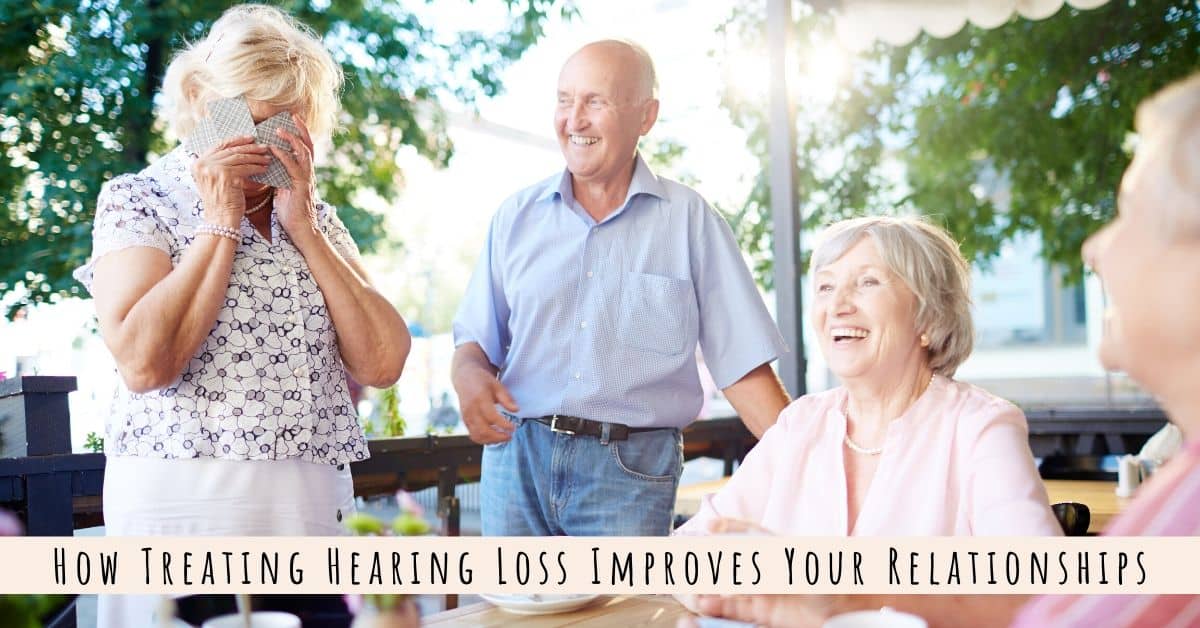In an increasingly interconnected world, communication is critical to how we live our lives. Interacting with others in day-to-day life and virtually is how we spend a lot of our time. Weather it is playing a team sport, spending time with friends, video chatting, having a family dinner; we seem to be constantly engaging with other people. Participating in these activities becomes more difficult if you are experiencing hearing loss.
Hearing loss is a common health concern that nearly 48 million Americans are navigating according to the Hearing Loss Association of America. Untreated hearing impairment reduces your ability to hear and impacts how you communicate. This has several effects on your life including straining your personal relationships. It is important to know that useful treatment is available and can drastically improve the quality of your life!
Symptoms of Hearing Loss
Anyone can experience hearing loss and any age. Impaired hearing can be caused by various factors including medical conditions, environmental exposure, and family (genetic) history. People experience hearing impairment in many ways, including:
- Difficulty hearing distinct words
- Increasing volume on devices such as phone, T.V., computer etc.
- Sounds seem muffled and unclear
- Frequently asking other people to speak loudly, slowly, and/or repeat themselves
- Ringing noise in one or both ears (known as tinnitus)
- Difficulty following conversations with multiple people and/or in environments with background noise
These symptoms make moving through your day challenging. You may want to engage with others less and withdrawal from social settings. This can really take a toll on how you feel and can cause your relationships to suffer.
How Relationships Are Impacted
Communication is the foundation for relationships. Hearing loss impacts your ability to hear and understand which presents challenges for communication. There are several ways this impacts relationships, including the following:
- Fatigue: the symptoms of hearing loss force you to go into overdrive as you attempt to hear. You may find yourself reading mouths to make out words you cannot hear and asking other people to repeat themselves. Resulting in such difficulty when trying to follow a conversation. This extra effort and energy you are required to use can leave you feeling depleted and exhausted. You may feel completely drained and fatigued by these interactions.
- Isolation: because of this fatigue, you can feel like you do not want to engage with other people. Navigating environments with background noise, social settings, and conversations with multiple people becomes overwhelming and too tasking. This can cause you to avoid spending time with family and friends, participating in social activities, listening to your favorite podcasts etc. Retreating and isolating yourself in this way can be detrimental for your mental health and general happiness.
- Overall Health: this all can take a toll on your overall health. You may feel frustrated, stressed, anxious, and lonely as a result of reduced ability to hear and withdrawing socially. Additionally, hearing loss has been linked to medical conditions which means if left untreated, you may be unaware of other possible health concerns you could be experiencing.
Fortunately, there are effective ways to treat hearing loss. With increased ability to hear (and communicate), you can move through your day and conversations easier. This allows you to participate in social activities, engage with other people, and listen to all your favorite things more fully and with greater presence.
Treatment
There are many useful ways to treat hearing impairment. We highly encourage you to begin by receiving a hearing assessment. This process is noninvasive and conducted by hearing healthcare professionals. Hearing tests measure the softest sound you can hear in both ears (and at what frequency and pitch). This information is used to establish your hearing health profile, which is important to determine the most effective treatment for you.
The most common treatment is hearing aids. Hearing aids are small devices that work to absorb, amplify, and process sound in both quiet and loud environments. With the innovative technology that exists today, there is a wide range of options that are available for people. Hearing aids can be highly customized to meet a person’s specific hearing needs ensuring that you can hear better!

